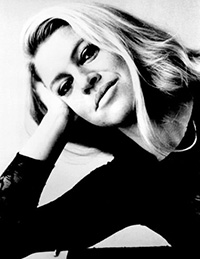
Nina Menkes
For me, cinema is sorcery, a creative way to interact with the world in order to rearrange perception and expand consciousness, both the viewers and my own.” — Nina
Considered a cinematic feminist pioneer and one of America’s foremost independent filmmakers, Menkes has shown widely in major international film festivals including multiple premieres at Sundance, the Berlinale, Cannes, Rotterdam, Locarno, Toronto, La Cinematheque Francaise, British Film Institute, Whitney Museum of American Art and The New York Film Festival.
Nina Menkes synthesizes inner dream-worlds with harsh, outer realities. She has been called “brilliant, one of the most provocative artists in film today” by the Los Angeles Times and her body of work was described as “controversial, intense and visually stunning” by Sight and Sound. Menkes has referred to herself as a witch, and Dennis Lim, writing in The New York Times, called her a “Cinematic Sorceress.”
A few scenes from Menkes’s fictional work:
According to film critic and historian Berenice Reynaud:
[Menkes] does not inscribe herself in a recognizable avant-garde tradition, she has no master and no disciples, which forces her to reinvent the history of cinema in her own terms, to struggle alone with formal and conceptual issues. This loneliness — both aesthetic and economic — is also embedded in the texture of the work. Yet, it is not the cliché loneliness of the romantic victim — it is more akin to the ‘night of the soul’ evoked by the mystics, Dante’s travel though a dark wood — or the heroic solitude of the knight-errant.”
For many years, Menkes worked closely with her sister Tinka Menkes, who was both her actress and creative collaborator, and Nina credits Tinka for many of the key radical aspects of their work. Menkes was one of the first women to present a feature film at the Sundance Film Festival. She won a Los Angeles Film Critics Association Award for her first feature MAGDALENA VIRAGA, a Guggenheim Fellowship, two Fellowships from the National Endowment for the Arts, an Annenberg Foundation Independent Media Grant, an American Film Institute Independent Filmmaker Award, three Western States Regional Media Arts Fellowships, two Fulbright Research Awards to the Middle East and a Creative Capital Award.
In 2012, The Menkes sisters’ feature film THE BLOODY CHILD was selected as one of the best five films of the past fifty years by the Viennale International Film Festival, in Vienna, Austria. THE BLOODY CHILD, which originally premiered at Sundance, received its restoration World Premiere at The New York Film Festival at Lincoln Center in 2021, where Menkes was introduced by Dennis Lim, Head of Programming as “one of America’s most important filmmakers”.
Menkes’s early features were selected for restoration by the Academy Film Archive and Scorsese’s Film Foundation, with funding provided by the Hobson/LucasFamily Foundation. The 2019 re-release of the restored QUEEN OF DIAMONDS (Arbelos Film Distribution, with EOS World Fund ) was a critical hit, being widely hailed as a modern masterpiece and selected as one of the year’s top ten films by Artforum magazine. In 2023 QUEEN OF DIAMONDS was selected for the National Film Preservation Registry at the Library of Congress.
A first generation American, Menkes has received two DAAD Artist in Residence in Berlin Awards, she is a descendant of holocaust survivors. Many of her films are set in the Middle East: Menkes shot and co-created a feature length documentary in Beirut, Lebanon, MASSAKER, about the Sabra and Shatila massacre, which premiered at the Berlinale in 2005 and received a FIPRESCI Award. Her Hebrew and Arabic language feature, DISSOLUTION (2012), shot in Jaffa, won “Best Drama” at the Jerusalem International Film festival and was a New York Times‘ Critic’s Pick, being described as “Exquisite and Remarkable”.
Menkes’s first black and white feature, PHANTOM LOVE (2007) premiered at Sundance to rave reviews. The film features Marina Shoif and Juliette Marquis in an unsettling examination of an enmeshed family in crisis. Shot on 35mm B&W negative film, DP Christopher Soos controlled the lighting with Menkes on camera.
In 2018-20 Menkes toured with her influential cinematic talk “Sex and Power; The Visual Language of Oppression”, which was presented at multiple high profile venues including AFI Fest, BFI London, Rotterdam Int’l Film Festival, the ‘Voice of a Woman’ series at Cannes, and Sundance’s BlackHouse. The talk was subsequently made into a feature documentary, entitled BRAINWASHED: Sex-Camera-Power (2022), with significant support from Executive Producers Tim Disney, Susan Disney Lord and Abigail Disney.
BRAINWASHED: Sex-Camera-Power premiered at Sundance 2022 and went on to screen at the Berlinale, CPH:DOX, Karlovy Vary, Frameline, IDFA and numerous additional film festivals worldwide. Released theatrically by Kino Lorber in partnership with Kanopy, it was named one of the top ten films of 2022 and 2023 by Film Comment, RogerEbert.com, IMDB, Screen Slate, Pinnland Empire, NPR, Sight & Sound magazine, The Guardian and many more. The Association of Women Film Journalists cited the film as an “Outstanding Achievement by a Woman in the Film Industry”, and it received the 2023 International Peace Prize for Film in Toronto, Canada.
Nina Menkes has an MFA with high honors from the UCLA Film School . She has taught at the USC School of Cinematic Arts, the Film and Television Institute of India (FTII), and California Institute of the Arts. She is a directing member of the Academy of Motion Pictures Arts and Sciences (AMPAS).
Filmography
- Brainwashed: Sex-Camera-Power (2022) UHD/107 minutes
- Dissolution (2012) 88 min/B&W/16:9 HD PAL
- Phantom Love (2007) 35mm film/87 minutes
- Massaker (2005) (co-director/director of photography) DV to 35mm/98 minutes
- The Crazy Bloody Female Center (2000) CD-ROM/180 minutes
- The Bloody Child (1996) 35mm film/86 minutes
- Queen of Diamonds (1991) 35mm film/77 minutes
- Magdalena Viraga (1986) 16mm film/90 minutes
- The Great Sadness of Zohara (1983) 16mm film/40 minutes
